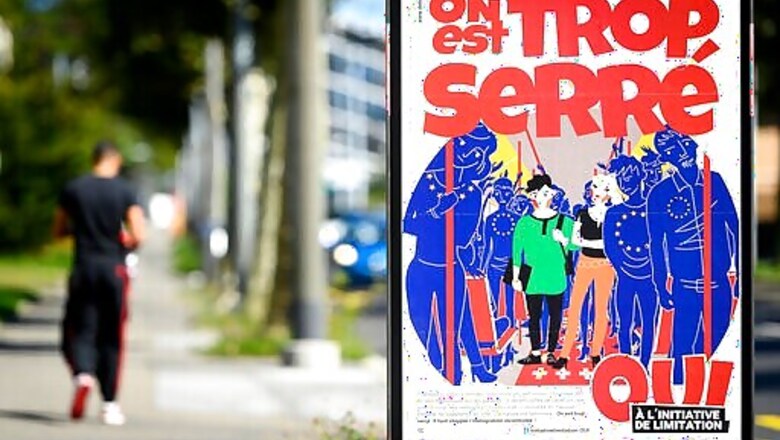
views
GENEVA: Voters in Switzerland on Sunday strongly rejected a nationalist party’s proposal to limit the number of European Union citizens allowed to live and work in their country.
Swiss public broadcaster SRF reported, based on a partial count, that the measure was rejected by 61.3% of voters, with 38.7% in favor. A large majority of the country’s 26 cantons, or states, also rejected the plan proposed by the Swiss People’s Party to give preferential access to jobs, social protection and benefits to people from Switzerland over those from the 27-nation bloc that surrounds it.
The government had warned that, if passed, the measure could have further strained the rich Alpines countrys deep and lucrative ties to the EU, of which it isnt a member. It could also lead to reciprocal disadvantages for millions of Swiss citizens if they want to live or work in the EU.
Roughly 1.4 million EU citizens live in the country of about 8.6 million, while around 500,000 Swiss live in EU countries.
In a similar referendum in 2014, the Swiss narrowly voted in favor of limiting access of EU citizens to live and work in Switzerland. Lawmakers, however, refused to fully implement the referendum fearing a hefty impact on Swiss society and businesses, prompting the Peoples Party to get the issue back on the ballot again this year.
Since the last vote, Switzerland has witnessed the turmoil that Britain’s 2016 referendum to leave the European Union has caused, especially for EU citizens in the U.K. and Britons living on the continent. Britain left the EU in January, but is in a transition period until the end of the year with prospects for a deal on future relations between London and Brussels still uncertain.
Voter Yann Grote in Geneva said he didn’t approve of further limiting freedom of movement.
“Im not at all in favor, and even more now, because its not a time to isolate Switzerland, he said.
Fellow voter Elisabeth Lopes agreed.
Im a daughter of immigrants, so it is a matter that touches me, she said. If Switzerland had to withdraw or reduce these agreements (with the EU), I think we would be the real losers.
The freedom-of-movement measure was being considered alongside nationwide votes on several other issues.
SRF reported that a majority of voters backed a plan for paid paternity leave while rejecting a measure that would increase tax breaks for child care. The outcome of votes on the purchase of up to 6 billion francs (about $6.5 billion) worth of new fighter planes by 2030, and the right to hunt wolves to keep their population down was still too close to call.
___
Frank Jordans in Berlin contributed to this report.
Disclaimer: This post has been auto-published from an agency feed without any modifications to the text and has not been reviewed by an editor




















Comments
0 comment